5. Hustle & Flow (Dir: Craig Brewer, 2005)
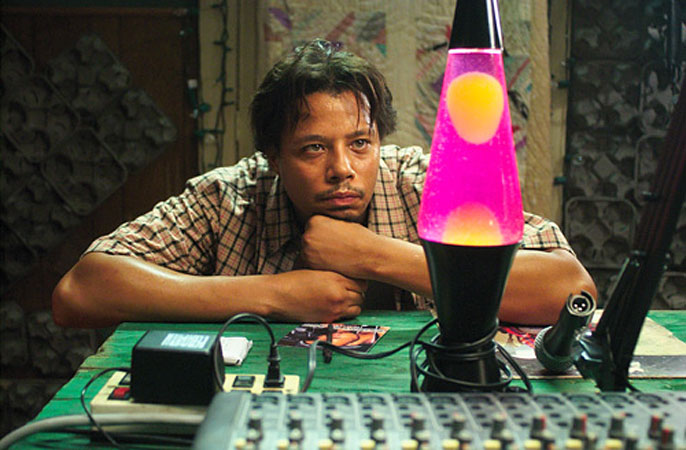
Is rap an off-shoot of poetry or is rap an element of hip-hop? This is one, among many, of the questions raised by Craig Brewer’s 2005 indie drama Hustle & Flow, a movie which, by all accounts, will have you convinced of hip-hop’s enduring literary merit and the ways in which putting pen to paper can endure as a form of therapy.
It also questions the value of suffering for one’s art. Much like Seamus Heaney, Terrence Howard’s DJay “dabbles in verse until it has become a life” and throughout the film he forgoes any opportunity to rise through the ranks of the hustling trade so that he can focus his energy on rapping full-time. And like most artists, DJay is not without his flaws: sensitivity to criticism, hubris and a sometimes remarkable penchant for cruelty, which gets him into trouble on more than one occasion.
Hustle & Flow is brutal, realistic, sometimes cynical, but above all it provides an important insight into the competitive dog-eat-dog nature of creativity. And its message ultimately is to persevere.
4. Paterson (Dir: Jim Jarmusch, 2016)
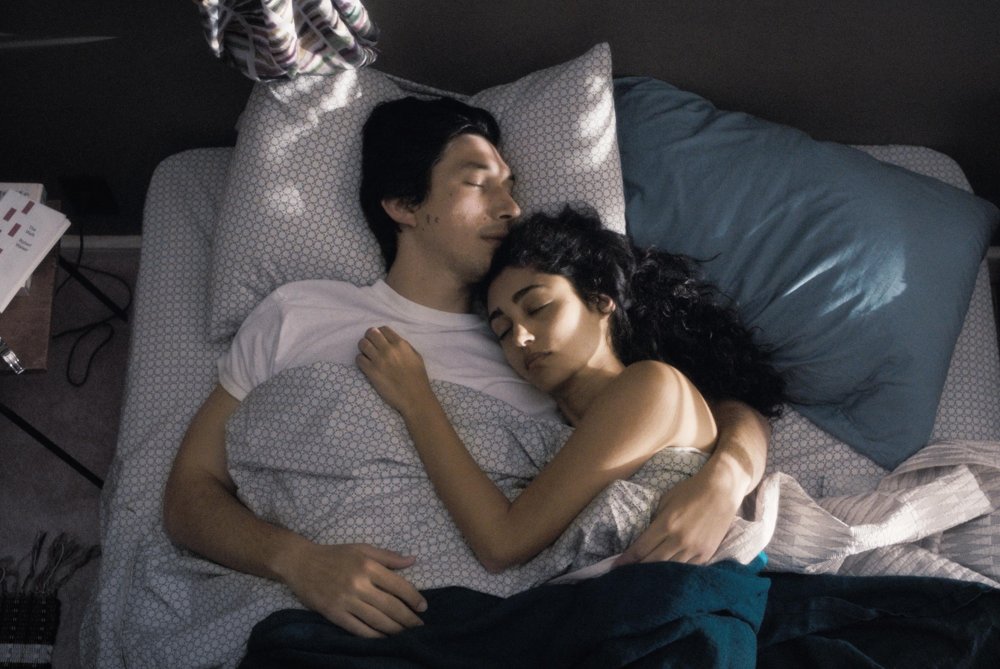
Though the first poem in Paterson may sound like it was penned on a deadline by Don Draper for an Ohio match-making company, don’t be fooled. Paterson’s ‘Love Poem’ powerfully evokes the American tradition of turning the garish, low-cultured world of consumerism into high-cultured art; an achievement made all the more astonishing by the (presumably) financially unstable life of the film’s bus-driver protagonist.
Popularised by the “New York School” of the early 1960’s, and by poets Frank O’Hara and John Ashbery in particular, the style of poetry evoked in Paterson acts as a kind of literary companion to pop-art. Finding beauty in the ordinary (which, after all, is what Jarmusch is all about).
So it is fitting that the poems featured in the film were penned by Ron Padgett, an early protégé of O’Hara’s and a playful, sensitive writer in his own right. It should also be said that Paterson does a great deal of justice to acknowledge the difficulties faced by emerging writers in the modern era, who struggle to craft optimistic and relevant art in a time of economic austerity. And more power to it for that.
3. Dead Poets Society (Dir: Peter Weir, 1989)
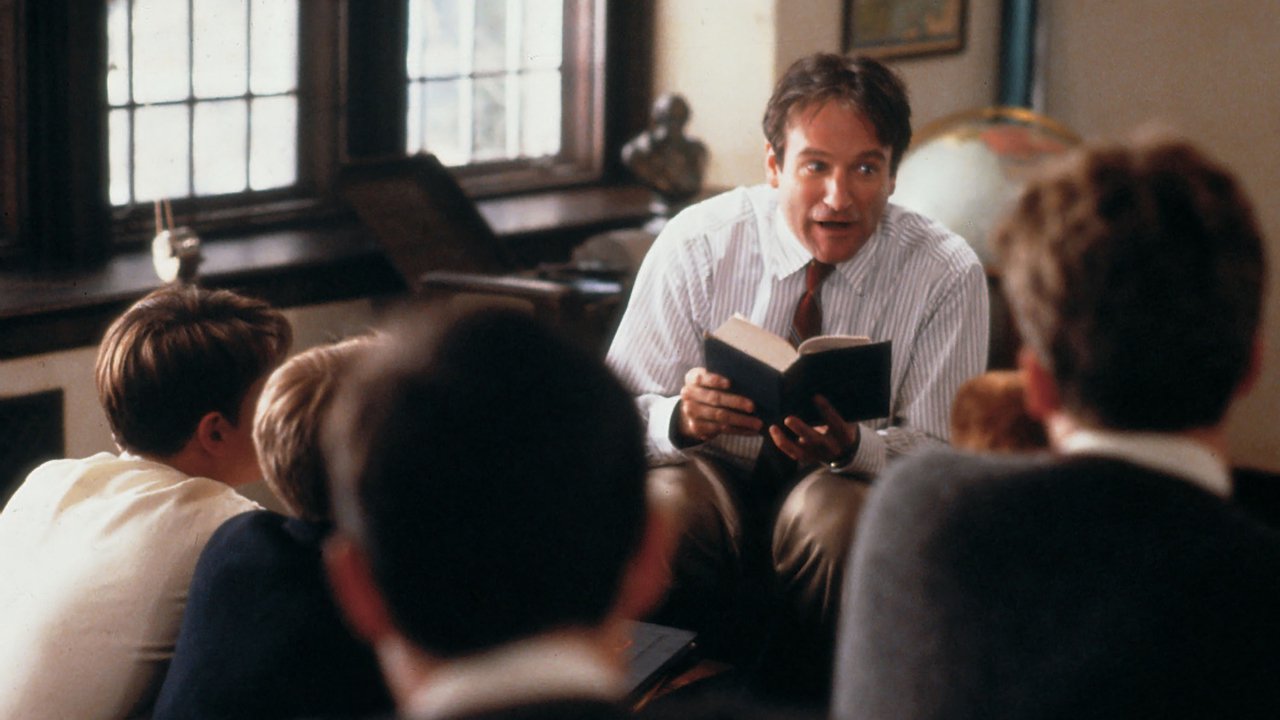
This is one of Peter Weir’s better movies, which is saying something considering that he’s the guy behind The Truman Show, Picnic at Hanging Rock and The Year of Living Dangerously.
When Dead Poets Society was released in 1989, all its component parts pointed straight to the box-office-turkey pile: prep-school setting, Vermont in the Autumn, the 1950’s, Walt Whitman. I mean, snore, right? But something about Robin Williams as the inspirational English teacher battling against bureaucratic odds just makes the thing work.
Think of any other “inspirational teacher” film that you’ve seen since: Dangerous Minds, Coach Carter, even Richard Linklater’s School of Rock. They all follow that same Dead Poets Society formula
But Weir, as ever, retains an ever-so-slightly cynical edge above all else and things don’t just “work out” for our heroes through hard work and perseverance. The real world is always there nipping at their heels, and as the credits start to role, you may feel the urge to jump up on your coffee table and start reciting ‘O Captain, my Captain.’
2. Total Eclipse (Dir: Agnieszka Holland, 1995)
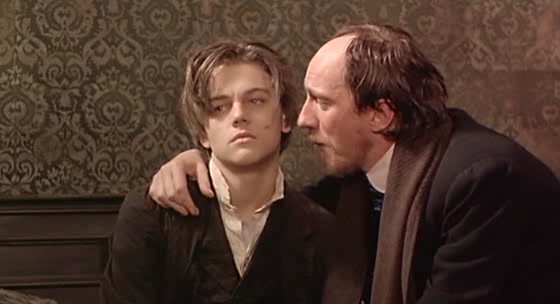
When people talk about Leonardo DiCaprio they often tend to define Titanic as the point beyond which he started to emerge as a “serious” actor. But the young curtain-haired heart-throb had a life before James Cameron’s 1997 epic, and there are a whole roster of interesting, gritty and challenging pieces to choose from before he was the name on the lips of every would-be Jack and Rose.
One of these films is 1995’s Total Eclipse, which concerns the real-life scandalous love affair between French Symbolist Arthur Rimbaud (DiCaprio) and the older Romantic Paul Verlaine (excellently portrayed by David Thewlis). If you don’t know anything about Rimbaud or Verlaine’s poetry, the film contextualises it well; suffice it to say that their legacy inspired the likes of Allen Ginsberg, Bob Dylan and Jim Morrison of The Doors.
Aside from their work, Rimbaud and Verlaine’s love affair makes for interesting reading by itself. They scandalised 19th Century Paris by running off together – a married man and a 16 year old boy – before eventually parting ways and the young Rimbaud giving up poetry altogether at the age of 21.
Much else happens in between, and though some liberties are taken by Christopher Hampton (who wrote both the screenplay and an earlier stage version of the story), Total Eclipse is a thoughtful, celebratory rumination on the poet-lovers who sought to achieve perfection through ‘A total derangement of all the senses.’
1. I’m Not There (Dir: Todd Haynes, 2007)
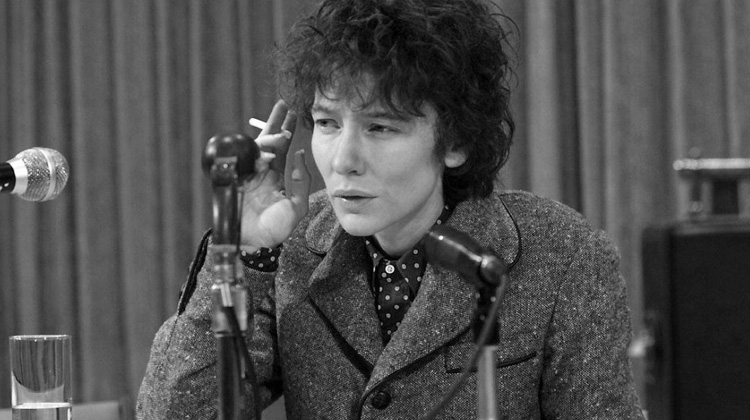
It’s appropriate, then, that Todd Haynes’s 2007 film I’m Not There begins with Bob Dylan as an extension (literally) of Arthur Rimbaud (played by Ben Wishaw). Appropriate also for a film about Dylan to top the list since he only recently (controversially) was the recipient of the 2016 Nobel Prize for Literature.
The movie runs as a series of non-linear monologues relating seven complex identities that feed into the Dylan aesthetic, including: Woody Guthrie (Marcus Carl Franklin), Jack Rollins/ Father John (Christian Bale), Jude Quinn (Cate Blanchett), Billy the Kid (Richard Gere) and Robbie Clark (Heath Ledger). All of these identities become crucial to understanding, not only the lyric and poetry of Bob Dylan, but the complex way in which American popular culture has developed since the mid-20th Century.
Guthrie is presented as “The Fake”; Dylan’s living encomium to his folk heroes from the 1930’s, played beautifully by Marcus Carl Franklin. Billy the Kid is “The Outlaw” Dylan post-Nashville Skyline and the living embodiment of America’s continued obsession with anti-authoritarianism.
Robbie Clark is the “Star of Electricity”. Rollins is “The Prophet” Dylan of Greenwich Village fame, then later “the Born Again Christian”. Quinn is “The Rock and Roll Martyr” of Dylan gone electric. Rimbaud is “The Poet” Dylan who charms the press and gives his views on everything from the nature of mortality, to chaos and the role of public responsibility.
The film is as varied as the persona of the man himself, and there are nods to Federico Fellini’s 81/2, Rob Reiner’s This is Spinal Tap and Robert Frank’s Cocksucker Blues. It works as a perfect introduction to Dylan, for sure, and also to American popular culture and the crushing weight of artistic integrity. This should be required watching for anyone who has ever picked up a pen.
Author Bio: James Conor Patterson is a writer based in Liverpool. His work has appeared in Magma, The Moth, New Welsh Review, New Statesman, Poetry Ireland Review, and The Stinging Fly. In 2015 he read as part of the Poetry Ireland Introductions series and in 2013 he received the iYeats ‘Emerging Talent’ Award for poetry. He has been highly commended for the Patrick Kavanagh Award, shortlisted for the Bridport Prize and longlisted for the Poetry Society’s National Poetry Award.